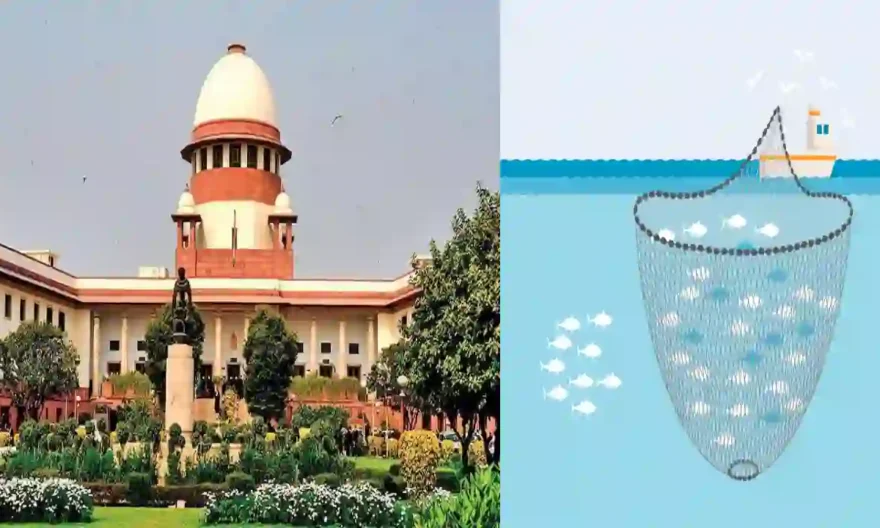
The Supreme Court passed an interim order on Tuesday in the case of Fisherman Care vs. Government of India and others, allowing purse seine fishing beyond Tamil Nadu’s territorial waters but within the Exclusive Economic Zone, but only on Mondays and Thursdays of each week.
What is Purse Seine Fishing?
Purse seine fishing involves encircling fish in open water with large vertical nets. The nets have cords similar to a drawstring purse, and the bottom part of the net is drawn together to enclose the fish in the same way that the cords of a drawstring purse are tightened.
A bench of Justices AS Bopanna and Sudhanshu Dhulia said that the Fisheries Department should only grant permission to boats that are installed with an approved Vessel Tracking System (VTS) and are kept running throughout the vessel’s operating time.
Mukul Rohatgi, a senior advocate, appeared on behalf of the Tamil Nadu government. For the Union government, additional Solicitor General KM Nataraj appeared. Senior Advocates Gopal Sankarnarayanan and Sirajudeen appeared for the appellants.
The Court left open the question of the legality of the purse seine fishing ban, which was upheld by the Madras High Court in 2021.
The following directions were passed by the Court in its order allowing the purse seine fishing:
- Only registered fishing vessels will be granted permission as on date, i.e. fishing vessels registered under Section 11 of the Marine Products Export Development Authority Act, 1972 (Central Act 13 of 1972) as well as registered with the State Government under its Rules or Regulations, which are currently in force in the State of Tamil Nadu.
- The Fisheries Department will only grant permission to boats that are installed with an approved Vessel Tracking System (VTS), which must be kept operational at all times.
- These vessels will be allowed to operate only twice a week, on Monday and Thursday of each week, with the same nonfishing period restrictions that apply to all other fishing activity.
- Vessels granted this permission must leave the coastline at or after 8 a.m. and must return to the designated location by 6 p.m. on the same day.
- All sailors must carry their biometric card/photo ID with them at all times.
- The VTS code must be provided to the Fisheries Department, Marine Police, Coast Guard, and Indian Navy.
- The State Fisheries Department shall assign a colour code to these Purse Seine Fishing Boats for the purposes stated above.
- These vessels’ registration numbers must be prominently displayed on the boat. To ensure that the vessels have only fished outside of the State’s territorial waters, the tracking data of each vessel for each of its trips must be submitted the same day to the concerned Assistant Commissioner of Fisheries, or such other designated officer, after the vessels arrive ashore.
- These boats will be allowed to land/dock only at one or more designated centres designated by the Fisheries Department.
- The State Fisheries Department shall post on its website the permission granted by it for this type of fishing, namely Purse Seine Fishing, to such individuals/companies as the case may be, as well as the registration number of each vessel.
The Tamil Nadu government’s Fisheries Department banned the use of purse seine fishing nets within 12 nautical miles (22 kilometres) off its coastline in 2000.
The High Court dismissed challenges to the same in separate petitions in 2019 and 2021, leading to the current batch of three appeals.
Notably, in refusing to reconsider the ban in the second round of litigation, the High Court noted that it was based on an informed decision and that only “a class of affluent fishermen” were moving it.
The petitioners in the Supreme Court have also challenged sub-rule 7 of the 2020 Tamil Nadu Marine Fishing Regulations, which allows for the ban.
The petitioners’ counsel before the Supreme Court submitted that only the Central Government can legislate on bans in territorial waters, and that they have already stated that such fishing is permitted.
It was submitted that many fisherfolk rely on this method for a living, and interim relief was requested because the fishing season is set to begin in February.
The counsel for the State government opposed the same, adding that purse seine fishing ends ups grabbing even protected species of fish and is harmful to marine ecology. Furthermore, any boundary beyond which such fishing is permitted would be difficult to enforce.
The top court was quite clear that the order was an interim one and that the ban imposed would continue to be in effect.
The bench stated that there are numerous aspects to investigate in the issue, even though the Union government is still studying it.
Despite the fact that the Union administration is still looking into the issue, the bench stated that there are other factors to consider.
The court noted, “There is undoubtedly a conflict between fishermen’s economic interests. Another factor that might be taken into account in this case is biological diversity. But as of right now, we don’t have a complete report on all of these factors. The Government of India is reportedly looking into the majority of these factors.”
As a result, the bench directed those pleadings in the main issue be completed. It then allowed purse seine fishing in a limited manner for the time being.




